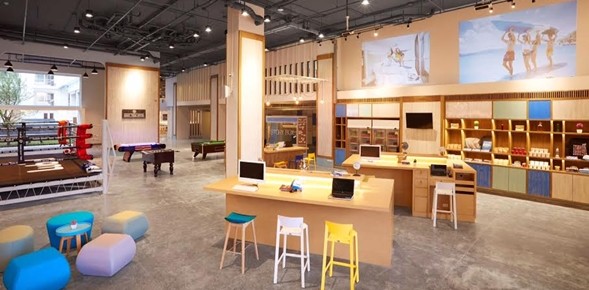According to a report on Hotel Market Trends in Southeast Asia by leading hospitality consulting group C9 Hotelworks there was an explosive 42% surge in new beds coming online in the 'flashpacker' category between 2015 and the third quarter of this year.
BANGKOK, Thailand – Southeast Asia’s booming tourism trade has experienced a new twist with a rising segment of second generation upmarket hostels now attracting a wider demographic. With a market size of over 1,200 properties and nearly 52,000 beds, the new and improved product is turning the heads of traditional hotels.
According to a report on Hotel Market Trends in Southeast Asia by leading hospitality consulting group C9 Hotelworks there was an explosive 42% surge in new beds coming online in the ‘flashpacker’ category between 2015 and the third quarter of this year. Thailand, Malaysia and Vietnam are now the top three players in the region, with Indonesia narrowing the margin with year-on-year growth of 73%.
Speaking about this evolving new accommodation space, C9’s Managing Director Bill Barnett said: “Hostels are unlike hotels as average rates are calculated on a per bed basis, compared to hotels which use a per room rate. Our research across Southeast Asia shows that if comparing the two accommodation models side by side, the average room rates in newer hostel properties are matching or exceeding those in the more established budget hotel tier.”
What has surprised many analysts is the growth in upscale hostel properties that now also offer a number of creatively designed private rooms.
“Ultimately the mix of accommodation and bed types in what are being term ‘poshtels’ attracts not only solo travelers and couples, but also taps the fast tracking friends and family group. Hostels are also set to take advantage of Asia’s low-cost airline carrier trajectory in a significant way,” added Mr. Barnett.
Viewing C9’s research, it soon becomes evident that a different business model works in city and non-city locations. Although the market average is 4.1 beds per room, this number shoots up in urban locations like Singapore where the average is just over 6 beds per room. Land prices in urban locations remain a significant factor, although unlike the more inflexible institutional approach to branded budget hotels; hostels can easily adapt to retro-fits and re-purposed real estate, hence an increasing number of groups are now developing a critical mass of properties.
Summing up the sector, Bill Barnett said:
“In Europe chains such as Generator and Meininger have attracted institutional investment to spur expansion, and we are already seeing private equity players in Southeast Asia start to chase the trail of what is arguable the region’s must exciting travel space.”
Vicky is the co-founder of TravelDailyNews Media Network where she is the Editor-in Chief. She is also responsible for the daily operation and the financial policy. She holds a Bachelor's degree in Tourism Business Administration from the Technical University of Athens and a Master in Business Administration (MBA) from the University of Wales. She has many years of both academic and industrial experience within the travel industry. She has written/edited numerous articles in various tourism magazines.














































































